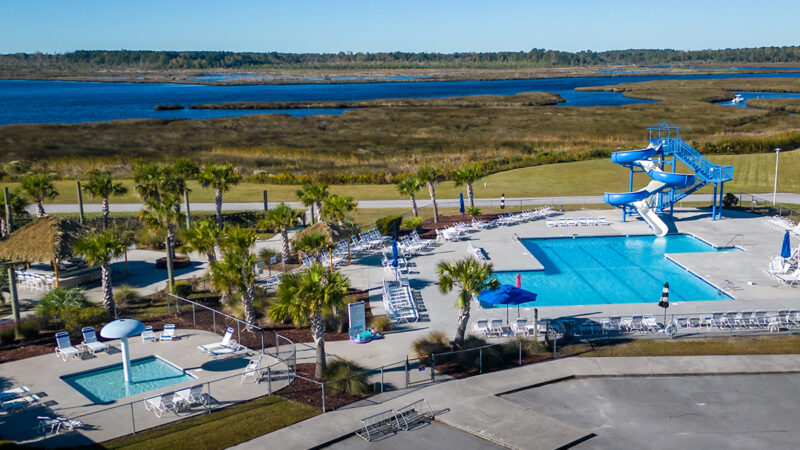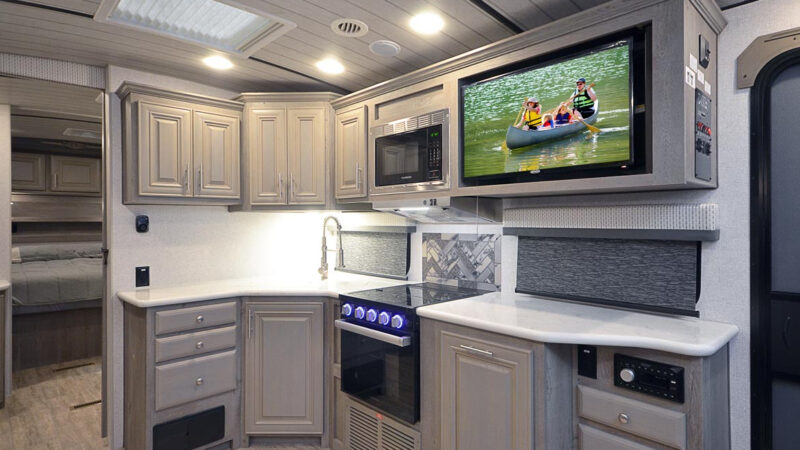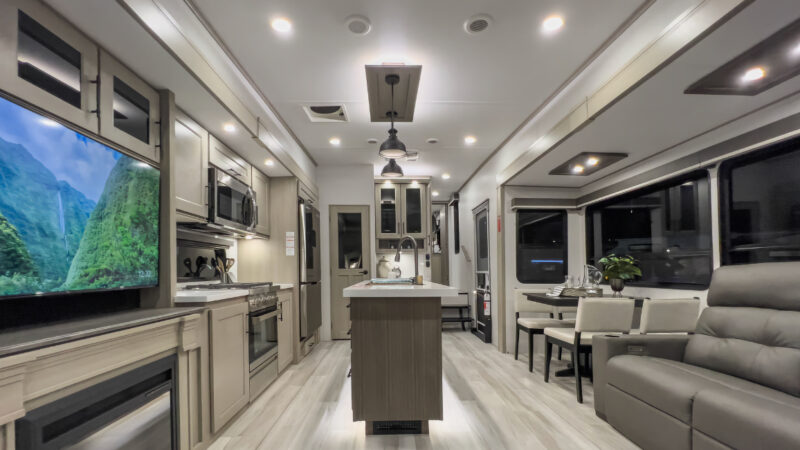Gear Review: EcoFlow Delta 2 Portable Power Station
As someone who has tested and reviewed numerous portable power stations over the years, it has been interesting to watch them evolve. Early models provided a decent amount of power but were often expensive, bulky, and took a long time to charge. Over time, however, these devices have gotten smaller, more affordable, and more powerful. So much so that the current generation of power stations are leaps and bounds better than their predecessors and continue to improve at a rapid clip.
Take, for example, the new EcoFlow Delta 2. This second-generation model takes everything that made the original such a compelling option and improves on it in every way. The result is a power station that is exceptionally well built, offers a plethora of charging ports, and provides enough energy to power just about anything you can plug into it. And despite those upgrades, it also manages to somehow get lighter and more portable.
So what does this mean for RVers looking for a portable power solution to use at the campsite? Read on to find out.
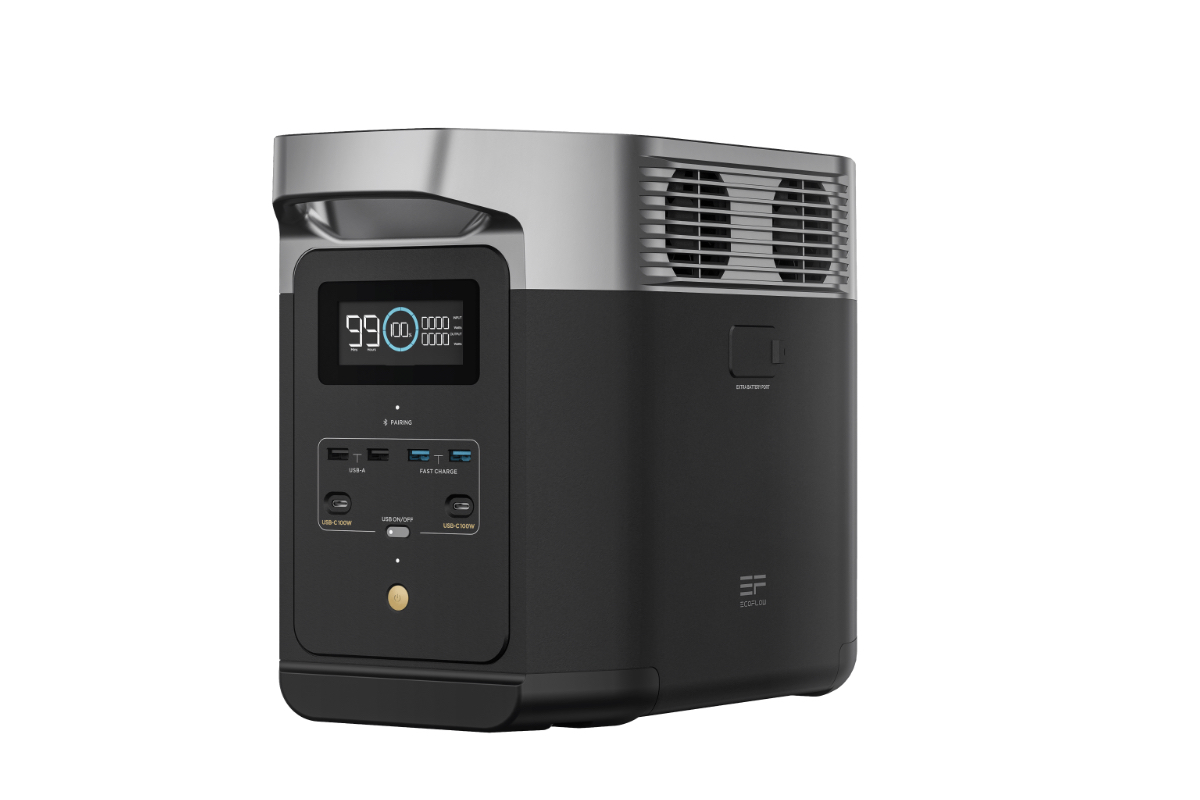
Photo Credit: EcoFlow
Power by the Numbers
When shopping for a portable power station of your own, there are two numbers to always keep in mind—battery capacity and power output. Capacity is typically measured in watt-hours (Wh) or kilowatt-hours (kWh) for models with larger power cells. This rating is a rough estimate of how much energy can be stored in the battery for use when powering appliances and devices.
For EcoFlow’s newest unit, that number is 1,000 Wh or 1 kWh, although the capacity is expandable to two or three kilo-watt-hours by linking additional Delta 2 power stations to one another. This feature gives Delta 2 owners the ability to greatly increase their stored power, although it requires purchasing additional power stations. That doesn’t necessarily come in handy at the campsite, but it does make this device an intriguing alternate power source for emergency use at home.
Power output is measured in watts and indicates how much energy the power station can provide to the devices plugged into it. Smartphones, tablets, and laptops require relatively small amounts of power to operate, while appliances like a refrigerator, electric stove, or TV require more wattage to function. The Delta 2 can produce a sustained output of up to 1800 watts, with an initial surge of up to 2700 watts. That “surge” number is important too, as some gadgets—like an air conditioner—require more power on start-up but reduce demand significantly once it is running.
What do those numbers mean in terms of real-world performance? According to EcoFlow, the Delta 2 can power 90% of all household appliances. Its battery capacity and power output allow it to recharge a smartphone up to 89 times or a laptop 16 times. It can also run a lamp, Wi-Fi router, or fan for as much as 30 hours on a single charge. Things get a little more muddled when dealing with appliances, as the power station can operate an HDTV for 8 hours, but a refrigerator will function for 7-14 hours, depending on size and efficiency. Appliances with a higher energy draw—such as a coffee maker or electric grill—also see their run times drop dramatically, typically falling to under an hour.
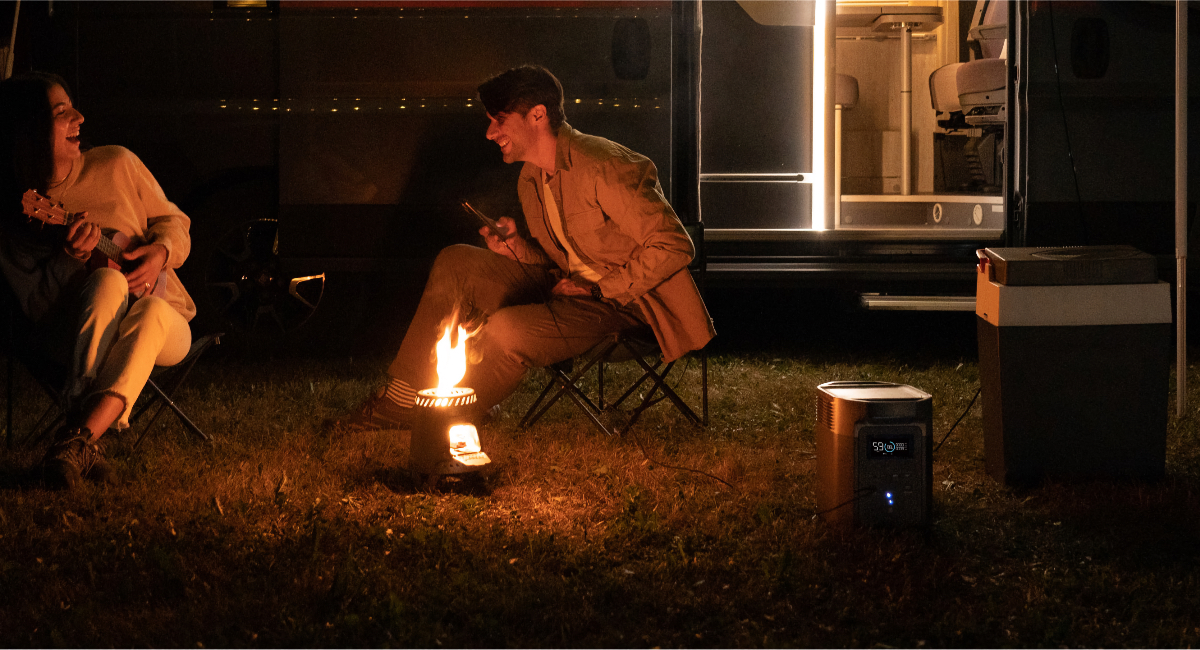
Photo Credit: EcoFlow
Any Port in a Storm
After battery capacity and power output, the next most important thing to consider when buying a power station is the number and type of ports that it offers. Early models usually came with two or three USB-A ports, a 12-volt port (think the cigarette lighter in your car), and possibly an AC outlet like the ones found in our homes. Modern power stations have upped those numbers significantly, adding not just more ports but a greater variety of options for charging modern devices.
The Delta 2 comes with enough ports to power up to 15 devices at the same time. Those include two standard USB-A ports, two fast-charging USB-A ports, and two 100-watt USB-C ports. It also has three 12-volt ports, one of which is the aforementioned car port, along with two “barrel” plugs. Finally, the power station comes with six AC wall outlets, although only two of those are the three-pronged variety that includes a built-in ground wire. That could limit usage depending on what you’re planning to plug into it.
All of those ports are fantastic to have at your disposal, although the reality is that you’ll probably never need to charge 15 devices at the same time. Still, the wide variety of options means that you’ll always have the correct ports for keeping your gadgets and appliances running. And if you are camping with a large group, there should be enough places for everyone to plug in when needed.
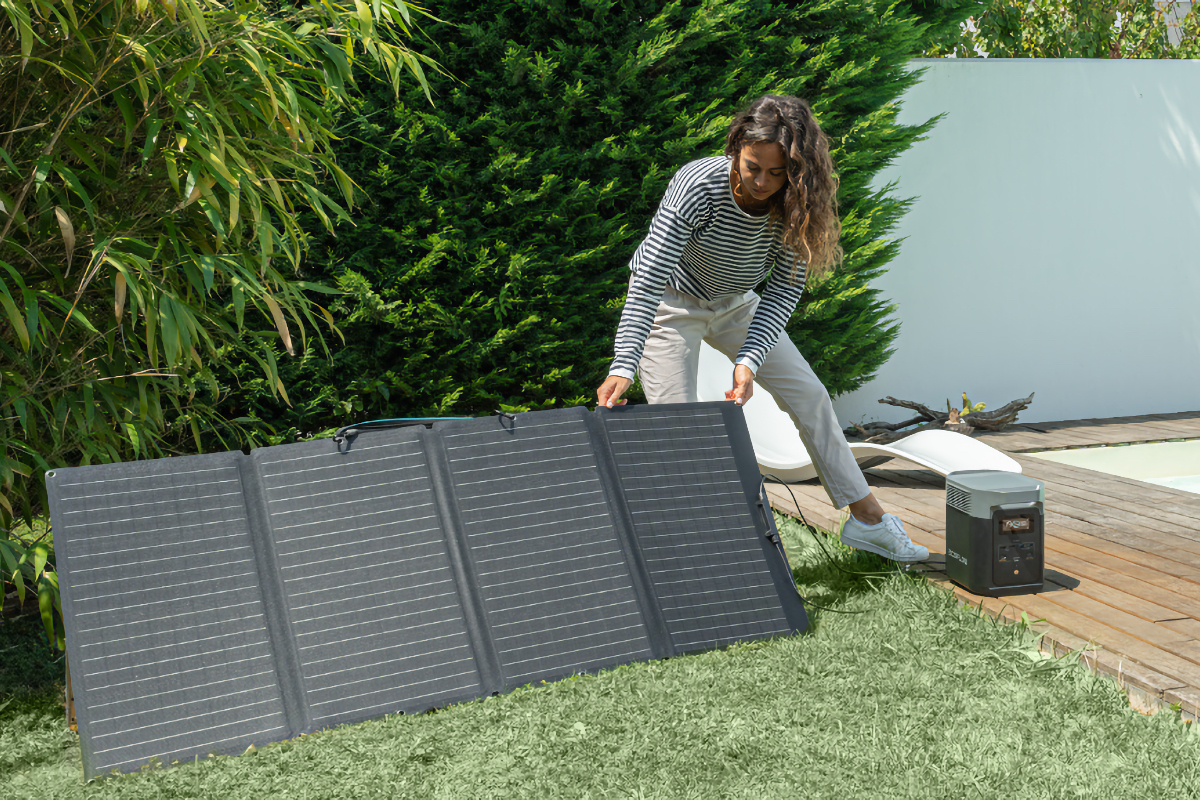
Photo Credit: EcoFlow
Charging the Power Station
As mentioned, the Delta 2 has a larger battery than its predecessor, but thanks to EcoFlow’s proprietary X-Stream technology, charging times are surprisingly speedy. The company claims the power station can go from empty to an 80% charge in as little as 50 minutes when plugged into an AC outlet. That feels accurate based on my testing. EcoFlow estimates an additional 30 minutes for topping off the final 20% of the battery, but in my experience, it was much quicker. The device is quite loud while charging via AC outlet, however, with multiple fans kicking in to help regulate its temperature.
While in the field, the Delta 2 can recharge its battery using the 12-volt port in your vehicle or via solar panels. The power station ships with the proper cable for plugging into your car port, with charging times taking up to four hours depending on how far you’ve depleted the battery. This is a good way to keep the unit charged while at the campground, although you’ll have to be cautious not to run down the battery in your truck or RV when doing so.
EcoFlow offers several different sizes of solar panels that can recharge the Delta 2 while camping off the grid. Those panels come in 110W, 160W, 220W, and 400W models, escalating in size and price as their wattage increases. When used under optimal conditions, the power station’s battery can be refilled in as little as 3-6 hours using just the light from the sun. But since you’ll rarely encounter the perfect conditions for solar while at the campsite, expect recharge times to take longer.
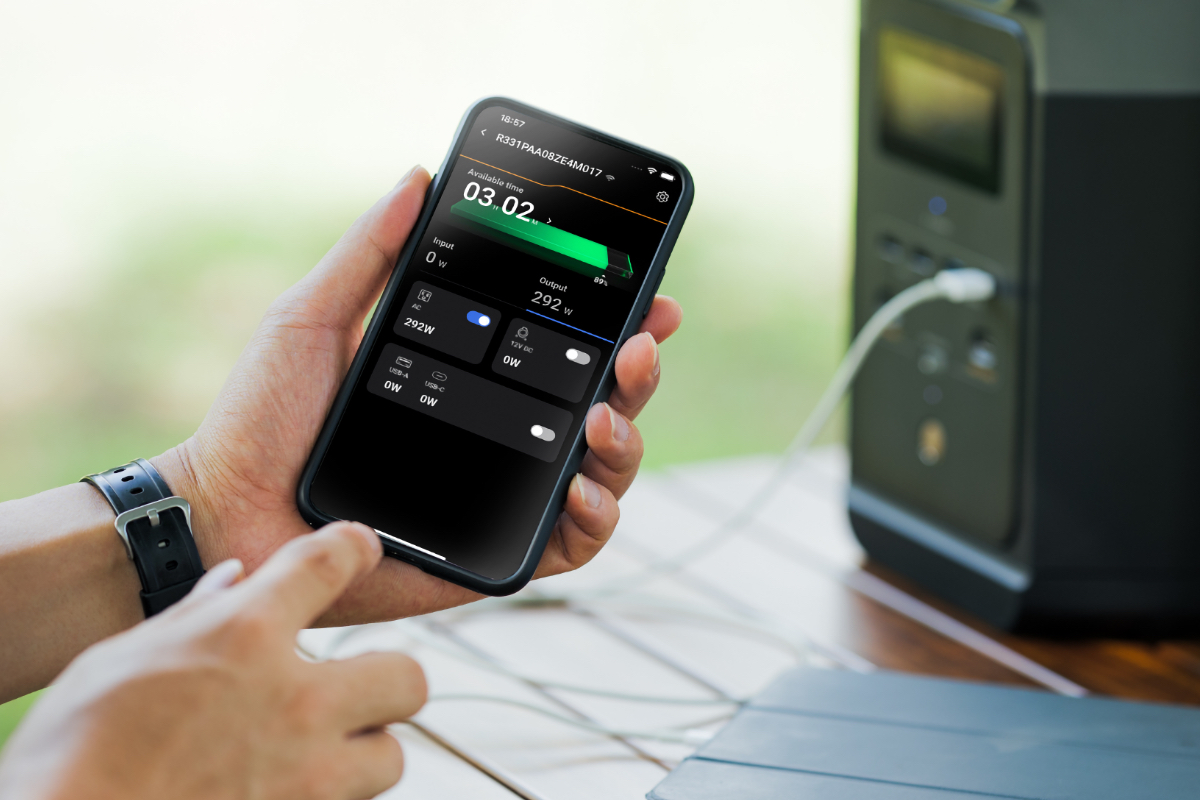
Photo Credit: EcoFlow
Remote Control
Delta 2 owners have the ability to control the power station remotely using EcoFlow’s app for iOS and Android. At home, your smartphone connects to the unit over Wi-Fi, while it uses Bluetooth to establish the connection in the field. This allows you to monitor the battery’s health and current charge levels and see which ports are using the most power. The app also can be used to customize power settings to extend battery life and update the unit’s firmware.
The second-generation Delta power station uses a LiFePO4 (lithium iron phosphate) battery, which offers several advantages over older power cell technology. For instance, this type of battery has a lifespan that is five to six times longer than traditional lithium-ion models. It also runs at a cooler temperature and is less prone to sparking a fire, making it a safer option too.
Additionally, LiFePO4 batteries are considerably lighter than lithium-ion, which improves the portability of a power station. With the Delta 2, EcoFlow increased capacity and power output while reducing the product’s weight. As a result, the power station weighs just 27 pounds, which is relatively light for a model that offers so much functionality.
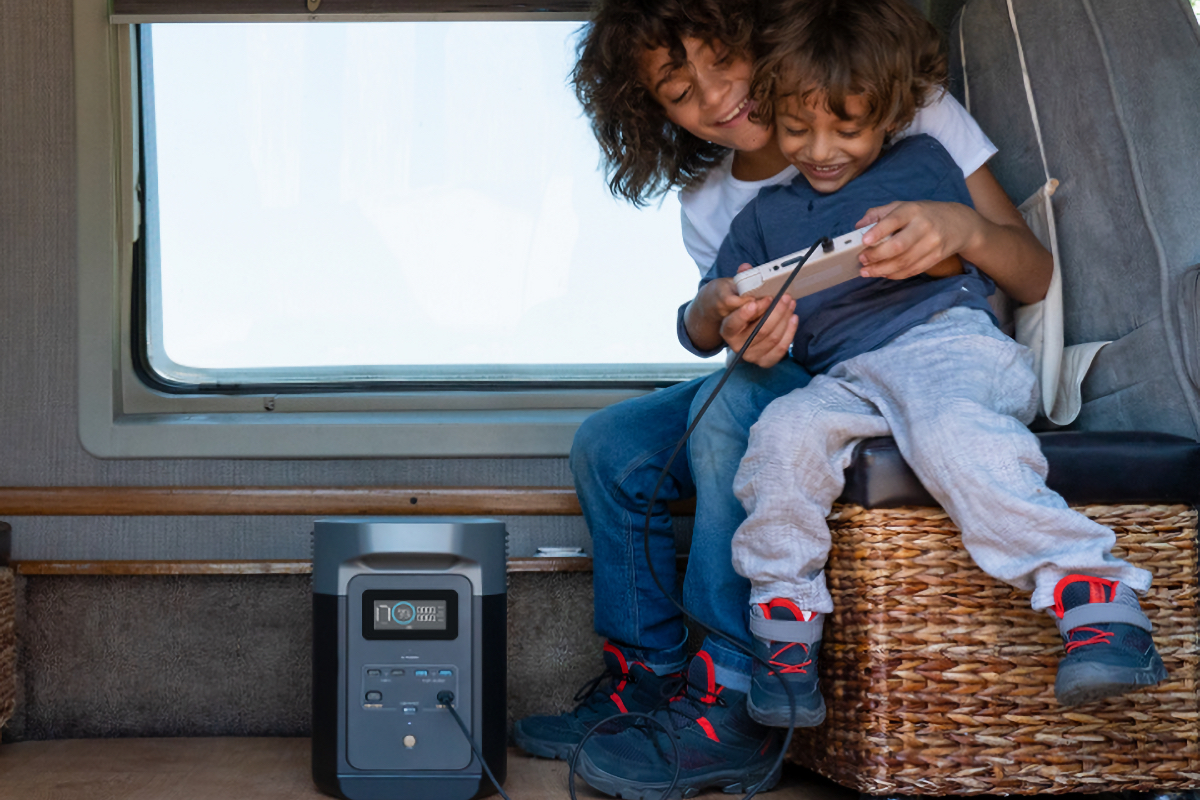
Photo Credit: EcoFlow
A Few Nits to Pick
While there aren’t too many glaring flaws to be found with the Delta 2, there are a few things that stand out. For starters, the power station’s design includes two protruding handles on either end, which are undoubtedly useful when carrying it around. But those same handles cause the unit to take up additional space, which could be an issue in the sometimes cramped environs of an RV.
As already noted, the Delta 2’s fans can get quite loud when they turn on. Typically this only happens while charging via an AC outlet or when plugging in a device that requires a lot of power. And while the power station doesn’t rival a gas-powered generator in terms of noise, it is somewhat distracting, especially since the unit is completely quiet most of the time.
Additionally, the Delta 2 is missing a few features that aren’t dealbreakers but would still be nice to have on any power station. For instance, a wireless charging pad would make a great addition to the device, which certainly has the surface area to accommodate that functionality. A built-in light is also handy around the campsite, and a larger solar controller would be nice, too. In its current form, the power station can only accept up to 500 watts of power via solar, which is significantly less than some of the competition.
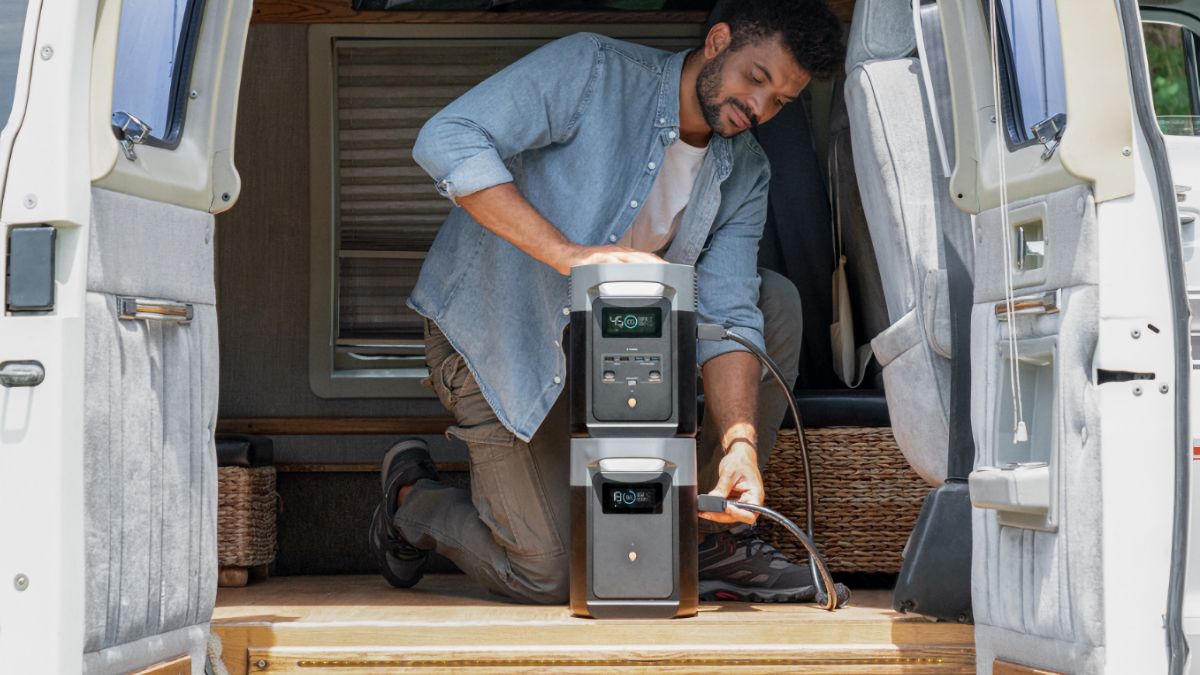
Photo Credit: EcoFlow
Final Thoughts
Those few minor issues aside, the EcoFlow Delta 2 is an outstanding portable power station. It packs a lot of features and capabilities into a relatively small and lightweight package, making it an excellent choice for RVers looking for an eco-friendly, off-grid power source. In fact, it occupies a very nice spot in the power station market, delivering the features that most people need without sacrificing portability.
EcoFlow has even managed to bring the Delta 2 to market at a great price point as well. Selling for $999, this power station is now the one to beat when it comes to battery capacity, power output, and number of ports. Other features—like remote monitoring and control via a smartphone app—are icing on the cake, adding convenience and value to an already great product.
If you’re in the market for a portable power station but have been holding off for the right model, the EcoFlow Delta 2 is the one you’ve been waiting for. It seamlessly combines impressive technology, excellent build quality, and a lightweight design to deliver on the promise of quiet, clean power for the campsite. But chances are, you’ll find plenty of other uses for it, too, as it is versatile enough to fit in at home, the job site, or anywhere else you need power on the go.
For more information, visit the EcoFlow website.
The post Gear Review: EcoFlow Delta 2 Portable Power Station appeared first on RV.com.
Source: https://www.rv.com/gear-accessories/gear-review-ecoflow-delta-2-portable-power-station/


